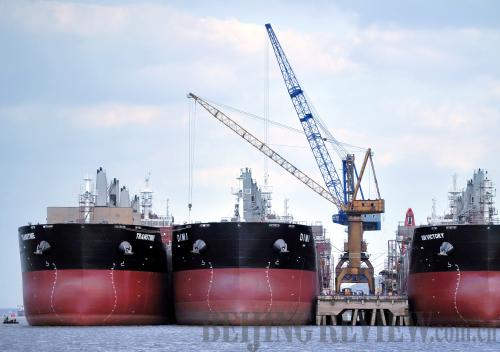|
 |
|
TO BE SAILING: Cargo ships being built in Nanjing, Jiangsu Province (WANG QIMING) |
Since exporters took a heavy blow from sluggish Western economies, China's economic growth was predominantly homegrown last year.
Buoyant investment helped put a solid floor under economic growth. Investment in fixed assets surged 23.8 percent from the previous year to reach 30.19 trillion yuan ($4.77 trillion) in 2011, which contributed 54.2 percent to last year's GDP growth, said the NBS.
Meanwhile, Chinese consumers have opened up their wallets to fill in the blank left by falling exports. While consumption accounted for 51.6 percent of last year's GDP, the contribution of net exports was -5.8 percent, according to the NBS.
Retail sales of consumer goods stood at 18.12 trillion yuan ($2.86 trillion) in 2011, rising 17.1 percent compared with 2010.
Zuo Xiaolei, chief economist with the Beijing-based China Galaxy Securities Co. Ltd., said the rapid expansion of the middle class and their increased spending could give the economy a boost, despite a prolonged downturn in Europe and the United States.
Per-capita disposable income of China's urban residents climbed 14.1 percent year on year in 2011 to reach 21,810 yuan ($3,445), while per-capita net income of farmers was 6,977 yuan ($1,102), up 17.9 percent year on year, according to the NBS.
"Since it takes time to complete the social safety net, the road to a consumer-oriented growth model will depend critically on real wage growth," she said.
The Ministry of Human Resources and Social Security said 24 provinces raised the minimum wage standard by an average of 22 percent last year.
In September 2011, the government raised the cut-off point for personal income tax to 3,500 yuan ($553) from 2,000 yuan ($316), which facilitated wage growth and boosted consumption.
Progress in improving social security could also help fuel consumption.
A pension program benefiting the country's 50 million unemployed urban residents that launched on July 1, 2011 has been implemented in 60 percent of the cities and townships.
Although a downward trend of GDP growth is inevitable due to external uncertainties and domestic rebalancing, China's economy will continue steering a steady course of growth.
Inflation, an acute headache for China in 2011, will calm down.
"Consumer prices will taper off markedly in 2012 as the economy slows, food prices retreat and imported inflation falters," said the Bank of China in a recent report, which predicted that the CPI will rise around 3.5 percent in 2012.
Zhuang Jian, chief China economist with the Asian Development Bank, also anticipated a downward trend in the overall price level in 2012 as a result of diminishing carry-over effects and the government's prudent monetary policy direction.
"There might be a certain degree of fluctuation in monthly figures, but the overall CPI growth will stay around 4 percent," he said.
Investment remains a pillar contributor to the macro-economy, said Qu Hongbin, chief China economist with the HSBC.
"China can use affordable housing and public welfare projects as a powerful buffer to offset the slowdown in private property," he said, adding that it has already begun.
Fan Jianping, a researcher with the State Information Center, agreed. "An expected slowdown in commercial housing construction will be compensated by the government's ambitious affordable housing plans," said Fan.
"Investments will remain supported by solid corporate profits and gradually easing monetary environment," said Lu Zhengwei, chief economist with the Industrial Bank Ltd.
"Infrastructure construction is likely to slow this year due to decreased spending on railways," said Lu. The Ministry of Railways recently announced that China plans to invest 400 billion yuan ($62.99 billion) on railway infrastructure construction in 2012, representing a slight decline from the 469 billion yuan ($74.1 billion) in 2011. "But massive input in water resources and energy development are already in the pipeline," he said.
Qu said a new driver will be the strategic emerging industries, including information technology and new materials. "A key target in the 12th Five-Year Plan (2011-15), was to boost those industries to account for 15 percent of GDP by 2015," he said.
In its Global Economic Prospects 2012 released on January 18, the World Bank predicted the Chinese economy will grow 8.4 percent in 2012 and 8.3 percent in 2013.
China is vulnerable to downturns in the United States and Europe, but a healthy balance sheet, slowing inflation and massive foreign reserves mean China can ease aggressively, if necessary, said the Bank of America Merrill Lynch, in a recent report.
The bank expected China to avert a hard landing and forecasts GDP growth of 8-9 percent in 2012.
"Affordable housing will be a crucial factor in restarting the growth engine. We don't doubt the Chinese Government's determination in building more affordable housing," said Lu Ting, a Hong Kong-based economist with the Bank of America Merrill Lynch.
Dong Tao, chief regional economist for non-Japan Asia at Credit Suisse, expected a soft landing in China as private consumption holds up because of salary increases, tax cuts and continued urbanization. He predicted quarterly growth in 2012 will be about 8-8.5 percent.
"If the economy weakens any further, we would expect future stimulus to be more focused on consumption than infrastructure. In the beginning, a fiscal stimulus would likely increase funding for affordable housing and provide consumption subsidies," he added.
Wang Tongsan, Director of the Institute of Quantitative and Technical Economics at the CASS, said China has better fiscal and financial resources than major developed economies, so it can avoid a balanced recession.
Wang expected this year's economic growth is likely to be 8-9 percent and CPI will be controlled within 4 percent.
This year's growth might be the lowest since 2003, but it would still be the world's fastest among large economies, said Wang.
| 